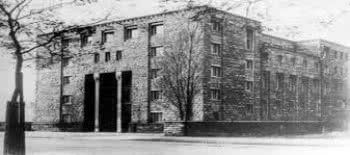The “Frankfurt School” (by the German Frankfurter Schule ) is the informal name for the interdisciplinary social theory school .
It was formed by dissident Marxists and members of the ” Institute for Social Research ” at the University of Frankfurt.
Historical Context: Summary
The Frankfurt School had its foundations founded in 1923. In that year, Félix Weil held a successful academic congress that brought together the main Marxist thinkers of the time.
However, the foundation of the “Institute for Social Research” ( Institut für Sozialforschung ) would only take place on June 22, 1924.
It was an annex to the University of Frankfurt that was under the direction of Carl Grünberg. He ran the institution until 1930, when Max Horkheimer took over.
Later, with the rise of Nazism, the institute was transferred to Geneva and Paris. In 1935, he was transferred to New York, United States.
There, he will be hosted by the University of Columbia until 1953, when the Institute for Social Research returns to Frankfurt definitively.
Main features
The Frankfurt School theorists were able to share their theoretical assumptions and develop a critical stance. This stance was opposed to the determinism common to positivist theories.
They were inspired by thinkers like Kant, Hegel, Marx, Freud, Weber and Lukács,
The “frankfurtianos” were also marked by the Marxist influence , however, they considered some social factors that Marx himself did not foresee.
His analysis falls on the “superstructure”. That is, the mechanisms that determine personality, family and authority, analyzed in the context of aesthetics and mass culture .
For scholars, domination techniques would be dictated by the Cultural Industry , which is mainly responsible for the massification of knowledge, art and culture.
The physical techniques of reproduction of the work of art, as well as its social function are also recurring themes of the school.
The most recent subjects that have dominated the studies of the Frankfurt School are:
- the new configurations of liberating reason;
- the emancipation of the human being through art and pleasure;
- science and technique as an ideology.
Frankfurt School and Critical Theory
The emphasis on the “critical” and “dialectical” component of Frankfurt’s theory are fundamental aspects for the elaboration of a theoretical framework.
Thus, it is able to carry out self-criticism as a way of rejecting any absolute claim.
Understood as a critical social self-awareness, “critical theory” seeks to change and emancipate the human being through enlightenment.
For that, it breaks with the dogmatism of the “traditional theory”, positivist and scientist, of which the main attribute is instrumental reason.
Therefore, critical theory seeks to situate itself outside the limiting philosophical structures.
At the same time, it creates a self-reflective system that explains the means of domination and points out the ways to overcome it. The aim is to achieve a rational, human and naturally free society.
This “self-reflection” is guaranteed by the method of dialectical analysis, by which we can discover the truth when confronting ideas and theories.
Thus, the dialectical method, applied to itself, is a self-correcting method for the sciences that use this thought process.
Main Thinkers
Frankfurt School thinkers analyzed and denounced some structures of political, economic, cultural and psychological domination of modern society.
They explicitly demonstrated the destructive capacity of capitalism , which was mainly responsible for the stagnation of political, critical and revolutionary consciousness.
They used resources from different areas to elaborate the bases of a critical theory of contemporary society and culture.
The main areas were: political science, anthropology, psychology, economics, history, etc.
The main Frankfurt thinkers were:
- Max Horkheimer (1895-1973)
- Theodor W. Adorno (1903-1969)
- Herbert Marcuse (1898-1979)
- Friedrich Pollock (1894-1970)
- Erich Fromm (1900-1980)
The greatest collaborator was Walter Benjamin (1892-1940), while the main member of the second generation was Jürgen Habermas (1929).
Main Works
Most of the Frankfurt School’s writings were published in the scientific journal of the group “ Zeitschrift für Sozialforschung ”.
It was later called “ Studies in Philosophy and Social Science ”.
However, some works stood out:
- Traditional Theory and Critical Theory (1937)
- Culture and Society (1938)
- Dialectic of Enlightenment (1944)
- Minima Moralia (1951)

